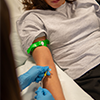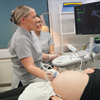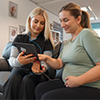Discovering a potential pregnancy is a significant moment, and understanding the accuracy of pregnancy tests is crucial. Home pregnancy tests are designed to detect the presence of human chorionic gonadotropin (hCG), a hormone produced during pregnancy. When used correctly, these tests can be up to 99% accurate.
Factors Influencing Test Accuracy
Several factors can affect the accuracy of home pregnancy tests:
- Timing: Testing too early can lead to false-negative results. It’s advisable to wait until after a missed period to test, as hCG levels may not be detectable immediately after conception.
- Test Sensitivity: Different tests have varying sensitivity levels. Some can detect lower levels of hCG, allowing for earlier detection.
- User Error: Not following the test instructions precisely can lead to inaccurate results. It’s essential to read and adhere to the guidelines provided with the test kit.
Confirming Pregnancy with Early Scans
For those seeking additional reassurance after a positive home test, early pregnancy scans are an option. These scans can be performed from around 6 weeks gestation, which is typically about two weeks after a positive test result. At this stage, it’s possible to confirm the pregnancy’s viability, visualise the heartbeat, and ensure the embryo is developing within the uterus.
NHS Guidance on Early Scans
The NHS typically offers routine ultrasound scans later in pregnancy, around 11 to 14 weeks for dating purposes and at 18 to 21 weeks for anomaly checks. However, if there are concerns such as pain or bleeding, an earlier scan may be recommended. It’s essential to consult with a healthcare provider to determine the appropriate timing and necessity of an early scan.
Private Early Scans
For those without specific medical concerns but seeking early reassurance, we offer early pregnancy scans starting from 6 weeks. We provide such services, allowing expectant parents to confirm pregnancy viability and visualise the heartbeat.
Conclusion
While home pregnancy tests are highly accurate when used correctly, factors such as timing and user error can influence results. For added reassurance, especially in the early stages of pregnancy, consulting with a healthcare provider and considering an early scan can provide valuable insights into the health and development of the pregnancy.
For more information on pregnancy tests and early scans, you can refer to the following resources:
Please note that while private scans can offer reassurance, they should not replace routine NHS antenatal care.













 Packages & Prices
Packages & Prices  Important Info & Policies
Important Info & Policies  Your Scan
Your Scan